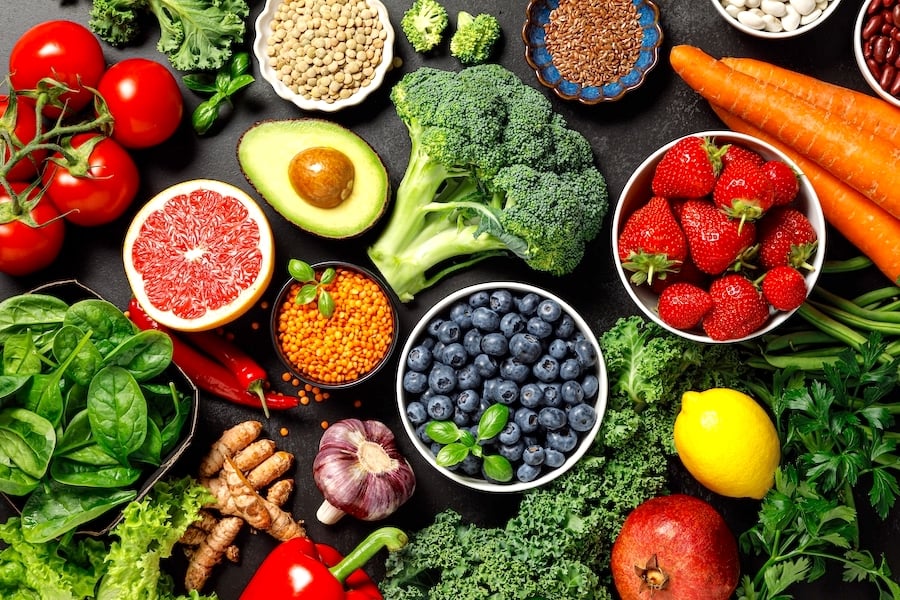Research Showing a Plant-Based Diet
Reduces Cancer Risks

Click orange links to open studies
“In 2105, the World Health Organization’s International Agency for Research on Cancer (IARC) concluded that red meat is a class 2 carcinogen and processed meats are a class 1 carcinogen.”
International agency for research on cancer
“There is a lack of intervention studies but there are abundant observational studies assessing the association between plant-based diets and cancer risk, including multiple longitudinal cohort studies and similar data from case-control studies that demonstrate a decreased overall cancer risk with plant-based diets.”
current nutrition reports, 2022
“This study provides evidence that adherence to a healthful plant-based diet may reduce the risk of breast cancer, especially those that are more likely to be aggressive tumors.”
Cancer epidemiology, biomarkers & prevention, 2014
“In summary, healthful plant-based dietary patterns may reduce the risk of non-breast-cancer mortality, whereas an unhealthful plant-based dietary pattern may increase the risk of this outcome. It is thus important to consider the quality of plant foods to achieve a healthful dietary pattern. Healthful plant-based dietary patterns may improve overall survival in breast cancer survivors.”
nutrients, 2021
“When analyzing the association of specific vegetarian dietary patterns, vegan diets showed statistically significant protection for overall cancer incidence in both genders combined and for female-specific cancers.”
Cancer epidemiology, biomarkers & prevention, 2013
“Plants are the source of many phytochemicals, and for this reason, it is not always possible to clearly determine which chemical compound has a significant anticancer effect. Nevertheless, it seems that phytochemicals have a significant preventive as well as therapeutic potential regarding gynecological cancers. For this reason, the consumption of larger quantities of vegetables, fruit, and whole-grain products should be a recommended action for the prevention of cancers, including gynecological ones.”
International Journal of molecular sciences, 2021
“This prospective study provides supportive evidence that greater consumption of healthful plant-based foods is associated with a lower risk of aggressive forms of prostate cancer, with stronger benefit among men aged <65 years.”
American Journal of Clinical nutrition, 2022
“These results provide preliminary evidence that adoption of a plant-based diet, in combination with stress reduction, may attenuate disease progression and have therapeutic potential for clinical management of recurrent prostate cancer.”
Integrative cancer therapies, 2006
“Plant-based diets were protective against cancers of the digestive system, with no significant differences between different types of cancer.”
Frontiers in public health, 2022
“Red meat consumption was associated with increased risk of overall cancer mortality, non-Hodgkin lymphoma (NHL), bladder, breast, colorectal, endometrial, esophageal, gastric, lung and nasopharyngeal cancer. Processed meat consumption might increase the risk of overall cancer mortality, NHL, bladder, breast, colorectal, esophageal, gastric, nasopharyngeal, oral cavity and oropharynx and prostate cancer. Dose-response analyses revealed that 100 g/d increment of red meat and 50 g/d increment of processed meat consumption were associated with 11%-51% and 8%-72% higher risk of multiple cancer outcomes, respectively, and seemed to be not correlated with any benefit.”
Food chemistry, 2021
“These meta-analyses have shown that saturated fat intake negatively impacts upon breast cancer survival.”
critical reviews in food science and nutrition, 2017
“The study’s findings indicated that women who consumed 1 or more servings per day of high-fat dairy had a 64% higher risk of dying of any cause and a 49% higher risk of dying of breast cancer. Among the high fat dairy products followed were cream, whole milk, condensed or evaporated milk, pudding, ice cream, custard, flan, and cheese or yogurts that were not low fat or nonfat.”
American cancer society journals, 2013
“Our data suggest a positive association between high-fat milk intake and prostate cancer progression among patients diagnosed with localized prostate cancer.”
International Journal of Cancer, 2017
“Frequent milk intake at ages 14–19 years was associated with a 3-fold elevation in risk for advanced prostate cancer. These findings highlight the potential role of early-life diet in prostate cancer risk and are consistent with migrant studies showing that it takes at least 1 generation for migrants to incur the prostate cancer risk of the host country.”
american journal of epidemiology, 2012
“Reduction in dietary fat with corresponding increase in vegetables, fruit, and grains led to benefits related to breast cancer, coronary heart disease, and diabetes, without adverse effects, among healthy postmenopausal US women.”
The journal of nutrition, 2019

